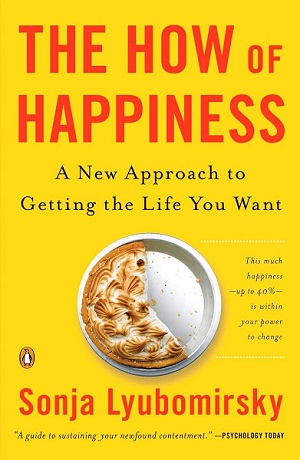The How of Happiness: A New Approach to Getting the Life You Want by Sonja Lyubomirsky offers a scientifically backed, practical guide to enhancing personal happiness. Based on years of research in positive psychology, the book outlines specific strategies that can lead to long-lasting happiness, debunking myths and offering actionable steps to achieve a more fulfilling life. Below are 20 lessons from the book:

Read: The Art of Happiness
1. Happiness is Partly Genetic, But You Can Influence It
- Lyubomirsky explains that approximately 50% of our happiness is genetically determined, 10% depends on life circumstances, and a significant 40% is within our control through intentional activities. This finding is empowering because it emphasizes that we have considerable power over our own happiness. By focusing on habits, thought patterns, and behaviors, we can raise our baseline happiness levels.
2. Happiness Activities: Intentional Actions to Increase Happiness
- The book emphasizes the importance of engaging in happiness-boosting activities, which include gratitude exercises, acts of kindness, savoring life’s pleasures, and setting personal goals. These activities are essential tools for anyone seeking long-term well-being. By integrating them into daily life, individuals can maintain a consistent sense of contentment.
3. Gratitude: The Foundation of Happiness
- One of the most profound lessons is the practice of gratitude. Regularly expressing gratitude—whether through journaling or telling others—enhances happiness by fostering a positive mindset. When you focus on what you’re grateful for, you shift attention away from negative thoughts and toward the good in your life, which leads to a more optimistic and content state of being.
4. Fostering Optimism and Positive Thinking
- Optimism plays a critical role in long-term happiness. Lyubomirsky encourages readers to practice optimism by visualizing future successes, focusing on positive outcomes, and re-framing negative situations. This shift in perspective can dramatically improve overall life satisfaction by reducing stress and increasing resilience.
5. The Power of Social Connections
- Social relationships are crucial for happiness. Lyubomirsky stresses that cultivating meaningful relationships—whether with family, friends, or community—creates a strong support system and leads to increased happiness. Investing time and effort into building and maintaining these relationships results in emotional fulfillment and a deeper sense of belonging.
6. Acts of Kindness: Giving is Receiving
- Acts of kindness towards others are powerful tools for boosting personal happiness. Whether it’s helping a friend, volunteering, or offering support to a stranger, these actions create a sense of connection and purpose. Lyubomirsky’s research shows that helping others leads to an increase in personal well-being, demonstrating the cyclical nature of kindness and happiness.
7. Savoring Positive Experiences
- Lyubomirsky teaches the importance of savoring positive experiences to enhance happiness. Savoring involves fully immersing oneself in positive moments—whether through mindfulness, reminiscing, or prolonging the experience. By appreciating small pleasures, such as a delicious meal or a beautiful sunset, individuals can extract more happiness from everyday life.
8. Developing Coping Strategies for Hard Times
- Everyone faces challenges, but Lyubomirsky emphasizes the importance of coping strategies for dealing with stress and adversity. She highlights adaptive coping mechanisms such as problem-solving, seeking support, and using humor to face challenges. These strategies build resilience and prevent difficult situations from overwhelming our happiness.
9. Mindfulness and Meditation: Keys to Inner Peace
- The practice of mindfulness and meditation is shown to reduce stress and increase happiness. By focusing on the present moment and letting go of worries about the past or future, mindfulness helps to create a sense of peace and emotional clarity. This practice can lead to greater self-awareness, emotional regulation, and an overall more fulfilling life.
10. Commitment to Intrinsic Goals Over Extrinsic Goals
- Lyubomirsky highlights the importance of pursuing intrinsic goals—goals related to personal growth, relationships, and community engagement—over extrinsic goals like wealth or fame. Intrinsic goals are more fulfilling and lead to long-lasting happiness because they align with our true values and provide deeper meaning.
11. Finding Flow in Daily Life
- Experiencing flow, or being fully absorbed in a challenging yet rewarding activity, is another key to happiness. Flow leads to deep satisfaction because it involves total immersion in the task at hand, creating a sense of mastery and accomplishment. Lyubomirsky suggests identifying activities that allow you to experience flow, such as creative hobbies, sports, or work-related tasks.
12. Physical Health and Happiness: The Mind-Body Connection
- Physical health is closely linked to mental well-being. Lyubomirsky stresses the importance of exercise, sleep, and a healthy diet as foundations for happiness. Regular physical activity, in particular, releases endorphins, reduces stress, and boosts energy levels, all of which contribute to a more positive mindset.
13. Self-Compassion and Forgiveness
- Being kind and forgiving to yourself is essential for long-term happiness. Lyubomirsky encourages practicing self-compassion by treating yourself with the same kindness and understanding that you would offer to a close friend. Letting go of self-criticism and embracing forgiveness (for both yourself and others) frees you from the burden of guilt and resentment.
14. The Importance of Personal Growth and Learning
- Personal growth and continuous learning are central to a fulfilling life. Lyubomirsky highlights that setting goals for self-improvement—whether it’s learning new skills, taking up hobbies, or pursuing education—helps maintain a sense of progress and achievement, which are key contributors to happiness.
15. Happiness Requires Effort
- One of the most important lessons in the book is that happiness requires intentional effort. It’s not something that happens passively or by chance. Consistently practicing the strategies outlined in the book—like gratitude, optimism, mindfulness, and kindness—can lead to significant and lasting improvements in happiness. But it requires commitment and regular practice.
16. The Hedonic Adaptation Trap
- Lyubomirsky explains hedonic adaptation, the phenomenon where people quickly return to a baseline level of happiness after positive or negative life events. To combat this, she suggests strategies such as introducing variety into pleasurable activities and practicing gratitude to keep positive experiences feeling fresh and meaningful.
17. Harnessing the Power of Religion or Spirituality
- Religion or spirituality can provide a framework for meaning and purpose, which contributes to happiness. Lyubomirsky suggests that, for many people, participating in religious or spiritual practices offers a sense of community, comfort, and understanding of life’s greater purpose, all of which are crucial for happiness.
18. The Role of Positive Thinking
- Lyubomirsky emphasizes the importance of positive thinking as a core component of happiness. By cultivating an optimistic outlook, focusing on the positive aspects of life, and reframing negative situations in a more constructive light, individuals can significantly enhance their mental and emotional well-being.
19. Customization: Tailoring Happiness Strategies to Fit You
- Not all happiness strategies work for everyone. One of the key takeaways from the book is that readers should experiment with different happiness activities to find what works best for them. Lyubomirsky advocates for a customized approach, encouraging individuals to focus on the strategies that align with their personalities and circumstances.
20. Gratification from Giving and Service
- Giving to others, whether through volunteering, mentorship, or simple acts of kindness, is a potent source of happiness. When we help others, we not only improve their well-being but also enhance our own. Giving brings a sense of purpose, increases social connections, and boosts self-esteem, all contributing to long-term happiness.
Conclusion:
Sonja Lyubomirsky’s The How of Happiness provides a comprehensive, research-based guide to achieving long-lasting happiness. From cultivating gratitude, optimism, and mindfulness to fostering meaningful relationships and personal growth, these strategies are proven to enhance well-being. The book’s emphasis on intentional actions and consistent effort empowers readers to take control of their happiness and lead more fulfilling lives (Amazon).



